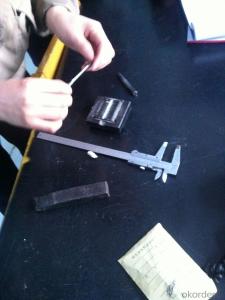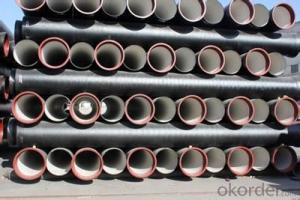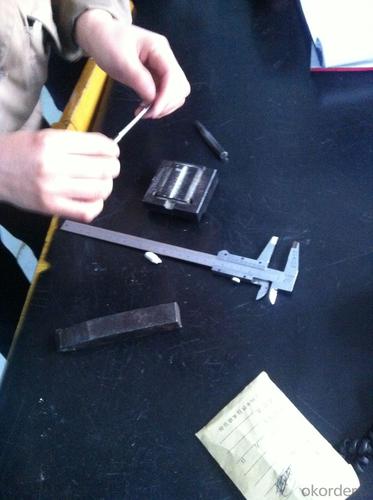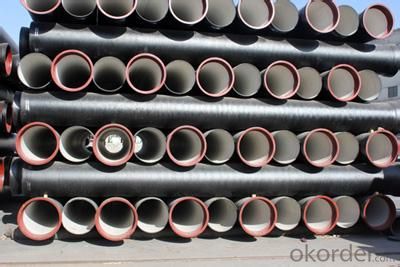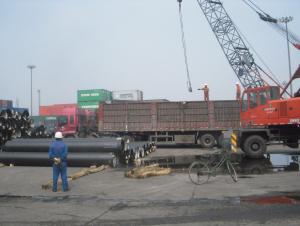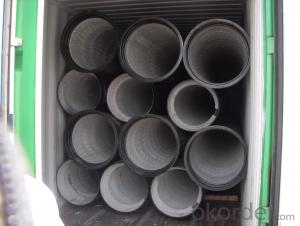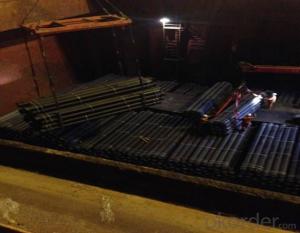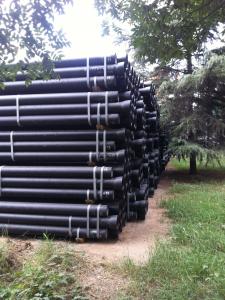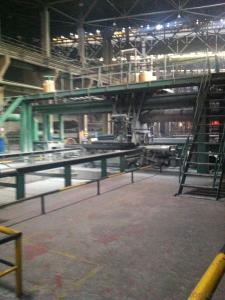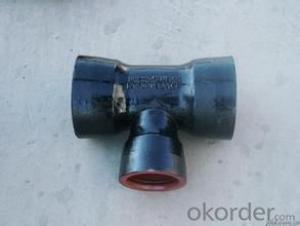DUCTILE IRON PIPE AND PIPE FITTINGS K8 CLASS DN300
- Loading Port:
- Tianjin
- Payment Terms:
- TT OR LC
- Min Order Qty:
- 23 pc
- Supply Capability:
- 3000 pc/month
OKorder Service Pledge
OKorder Financial Service
You Might Also Like
Material : Ductile Cast Iron
Size Range : DN 80mm to DN 2000mm
Unit Effective Length : 6m or 5.7m
Manufacture Standard: ISO 2531:1998/ EN 545:2006/EN 598:2007
Annual capacity : 200,000 tons
Coating Exterior: Zinc 130g/m2 according to ISO 8179-1 and bitumen coating 70 microns.
Cement Interior: Portland Cement/ High Alumina Cement/ Sulphate Resisting Cement Lining according to ISO 4179
Special requirements on external coating and internal lining can be applied
We also provide accessories such as SBR/EPDM rubber gaskets, lubricant paste, pipe caps, PE sleeves, etc.
Additional Parts:
Each pipe is strictly inspected according to related standard to ensure permanently high performance.
Easy Installation at site and service free for life
Long Service Lifespan
Quotation will arrive you within 24hours once we get your inquiry.
We guarantee offering you a competitive price.
A copy of original inspection reports of pipes will be offered after shipment.
Photos of loading process will be sent to the customer after shipment effect.
We will follow-up the delivery progress after shipment effect and update to the customer on weekly basis.
- Q: The difference between ductile iron pipe and UPVC drain pipe
- UPVC tube or rigid polyvinyl chloride pipe, U-PVC pipe, is a kind of strong corrosion resistance, acid and alkali salt oil medium erosion, light quality, has certain mechanical strength, good hydraulic conditions, convenient installation, but easy to aging, high temperature resistant, but can not withstand the impact, applied to the domestic water system, DN50 pipe connection DN65, using a ring connected with the above.
- Q: How do ductile iron pipes perform in sandy soil conditions?
- Ductile iron pipes perform well in sandy soil conditions due to their inherent strength and durability. The material's high tensile strength allows it to withstand the pressure exerted by the surrounding soil, preventing pipe deformation and breakage. Additionally, the corrosion resistance of ductile iron ensures a longer lifespan, even in corrosive sandy soil environments.
- Q: Are ductile iron pipes resistant to impact damage?
- Ductile iron pipes are known for their exceptional strength and durability, making them highly resistant to impact damage. Due to their unique composition, which includes a higher percentage of carbon and silicon, ductile iron pipes possess excellent toughness and flexibility. This allows them to withstand external forces and impacts, such as heavy construction equipment or accidental impacts during installation or maintenance activities. Additionally, ductile iron pipes have a high resistance to cracking and fracturing, further enhancing their ability to withstand impact damage. However, it is important to note that while ductile iron pipes are highly resistant to impact damage, they are not completely immune. Extreme or repeated impacts may still cause damage, albeit to a lesser extent than other types of pipes. Regular inspections and maintenance are crucial to identifying and addressing any potential impact damage to ensure the long-term integrity and performance of ductile iron pipes.
- Q: When the ductile iron pipe is pressed, the three links are always running out. What should be done?
- If the pipe is not laid, but installed outdoors, it is recommended to cement the pier and stabilize the pipe at the three and the pipe connection. The problem of the above situation lies in the pressure test in the open air, the outer wall of the pipe without the external pressure and the balance of internal pressure. Xin hot pipe industry
- Q: Can ductile iron pipes be used for both water and sewage systems?
- Yes, ductile iron pipes can be used for both water and sewage systems. Ductile iron pipes are known for their strength and durability, making them suitable for various applications. They have excellent resistance to corrosion and can withstand high pressures, making them ideal for transporting both water and sewage.
- Q: What is the K9 standard pressure for ductile iron pipes?
- Ductile weakness: ductile cast iron pipes connected by human factors such as the operation level of responsibility, influence, construction not convenient. The advantages of PE PE PE pipe has good corrosion resistance and its anti inorganic performance than that of the metal pipe is much stronger in the buried without corrosion, construction convenient. Small diameter PE pipe in the price performance ratio is better than that of steel and ductile iron.PE tube have disadvantages: benzene, gasoline, carbon tetrachloride and other organic solvents have certain effect on pe. If the organic solvent is infiltrated into the polyethylene, the swelling will occur, and its physical properties will be decreased. Its pressure resistance and temperature resistance are poor.
- Q: Are ductile iron pipes suitable for irrigation canal systems?
- Yes, ductile iron pipes are suitable for irrigation canal systems. Ductile iron pipes have high strength and durability, making them resistant to external loads and pressure variations common in irrigation systems. They also have excellent corrosion resistance, ensuring a long lifespan and minimizing maintenance needs. Additionally, ductile iron pipes have smooth interiors, reducing friction and allowing for efficient water flow, which is crucial for irrigation canal systems.
- Q: Can ductile iron pipe be used for agricultural irrigation systems?
- Yes, ductile iron pipe can be used for agricultural irrigation systems. It is a strong and durable material that can withstand the high pressures and corrosive environments often found in agricultural irrigation systems. Additionally, ductile iron pipe has excellent resistance to external loads and impact, making it suitable for various soil conditions in agricultural fields.
- Q: How do ductile iron pipes handle ground movement due to tree roots?
- Ductile iron pipes have excellent resistance to ground movement caused by tree roots. The material's high strength and flexibility allow it to withstand root penetration and continue to function effectively. Additionally, the joints in ductile iron pipes are designed to accommodate some degree of movement, further minimizing the impact of tree roots on the pipe's integrity.
- Q: Are ductile iron pipes suitable for use in seismic areas?
- Yes, ductile iron pipes are suitable for use in seismic areas. Ductile iron has high strength and flexibility, making it resistant to seismic forces. It is able to withstand ground movements and vibrations during earthquakes without significant damage, making it a reliable choice for water and wastewater infrastructure in seismic areas.
Send your message to us
DUCTILE IRON PIPE AND PIPE FITTINGS K8 CLASS DN300
- Loading Port:
- Tianjin
- Payment Terms:
- TT OR LC
- Min Order Qty:
- 23 pc
- Supply Capability:
- 3000 pc/month
OKorder Service Pledge
OKorder Financial Service
Similar products
Hot products
Hot Searches
Related keywords
